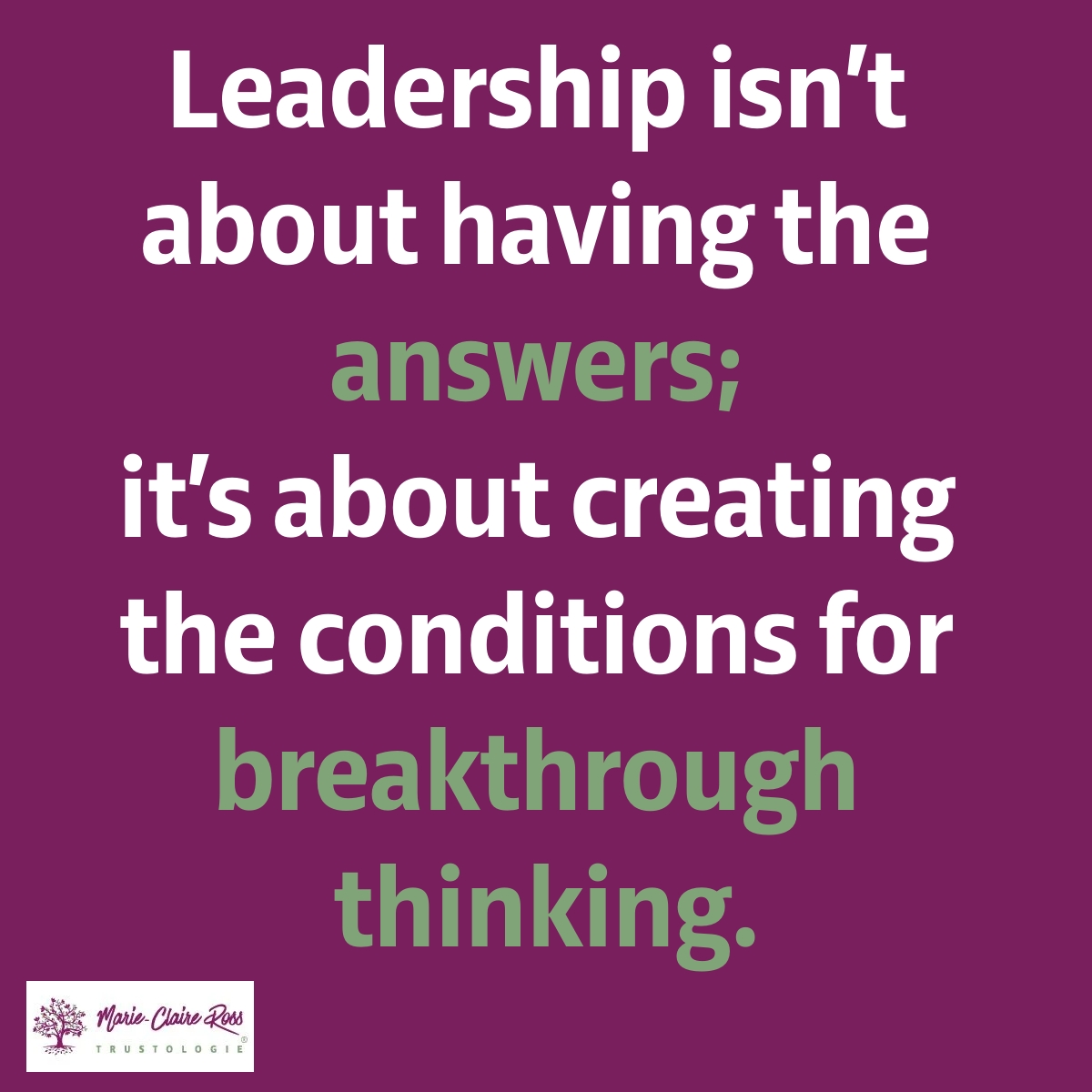8 min read
Beyond the "Why": 5 Coaching Secrets to Unlock Curiosity in Leadership
When my daughter was 17 months old, she discovered a superpower: the word “Why?”For the next two years, it was her response to almost everything.
Develop leaders, strengthen executive teams and gain deep insights with assessments designed to accelerate trust and performance.

Transform how your leaders think and perform with keynotes that spark connection, trust and high-performance cultures.

Explore practical tools, thought-leadership and resources to help you build trusted, high-performing teams.

Trustologie® is a leadership development consultancy founded by Marie-Claire Ross, specialising in helping executives and managers build high-trust, high-performing teams.

5 min read
Marie-Claire Ross : Updated on October 25, 2022

Over the last couple of months, you might have heard of a new workplace term called quiet quitting. A controversial phrase that started on TikTok generating millions of views with Gen Z workers rejecting the notion of working above and beyond their job title.
When I first heard the term, I was quietly not amused. Something in my heart breaks when people go off to work to get a pay cheque, but don't care about customers or their fellow workers. It's why shopping in some retail stores can be a traumatic experience, as well as ringing a support line for help. It's a fake and lazy way to live your life. Not only does it lessen the quality of lives around you, but it also keeps you trapped in misery.
When I dug a little bit deeper and watched a load of TikTok videos (which would deeply embarrass my teenagers), I understood what the youth are saying (saying youth would also deeply embarrass my teenagers). And as an adult, I have to ask, have we got it wrong? Are young people rejecting outdated norms that were passed down to us that we just had to accept and conform?
Quiet quitting isn't about not working. Nor is it about resigning. It's not even about putting minimal energy into your job. It's actually about having a life outside of work and not letting the trauma of work get you down. It's about putting clear boundaries around your work and personal life.
When I think back to the start of my career (back in the 90s) I had a terrible time trying to fit in. Fresh from University, working 8am-6.30pm getting up early and working long hours took a bit of getting used to. But it was the constant disapproval, political games, vague communication and insults from leaders that were the hardest. I was scolded for not wearing expensive suits, looking too young, sounding too young and having long hair. I was even told to have voice lessons, so that I sounded older. On top of that were intense deadlines and pressures to get work done where it was not unusual to work 13 hours a day. All while earning a pittance and finding it hard to have time to cook food, organise time for medical appointments or live in a tidy apartment.
In those days, the job market was tough and we were constantly told we were lucky to have a job. There was also the story they fed us that the hard work would pay off and we would get promoted and be in the top 1% of salary earners. Well, that might have been the case for some of my peers, but it wasn't the case for me. Those long hours where I was unpaid contributed to those who owned shares in the company or as big bonuses for directors. I flamed out of the market research industry after five years.
To get through it, I did quiet quitting (yeah, I've always been a trend-setter). Determined to not be controlled and to conform to standards I disagreed with, I decided to do the hours required knowing that on weekends I could be myself in nightclubs. I was quietly rebelling from a world that felt as uncomfortable as a starched cotton shirt. In my youthful indignity, I felt that was the way I could reclaim my identity. Dancing and feeling joyful was who I really was - rather than an uptight, Country Road wearing professional who was constantly under pressure (and looking down at others). In reality, it was my feeble attempt to feel like I was still having a life (and enjoy the Melbourne house scene (completely sober) which I now realise was world famous).
When it comes to quiet quitting, I am going to side with workers who do the hours during the week and disconnect after hours. I am not sure if that's quietly quitting or putting your own mental health needs first.
Where it gets confusing is that some people are labelling quiet quitting with different terms.
Some Gen Z's think it's about putting tougher boundaries as to how much work they will do outside of their job description. Again, I'm not sure if that's quiet quitting, or just not being open to expanding your skills (which is key to enjoying our jobs). While others think it's not caring about the job (which means you're in the wrong job or not quite ready to be a responsible adult).
Let's face it - the transition from young adulthood to being a mature adult is rocky and filled with pot holes. It's no wonder young workers are rejecting the old assumption that you have to work ridiculous hours and worry about everything to get ahead. It makes you very unhappy and it impacts your health. The realisation that you probably have fifty more years of working for a living is probably a tad frightening.
Maybe quiet quitting is more of a quiet reckoning that is just getting louder - we are still in the midst of the Great Resignation, the rules of work have changed and will never go back to before. According to Gartner, 65% of employees have reevaluated their working and personal life since the pandemic. It makes sense that Gen Z are entering the workforce and questioning the old rules of starting your career.
For years, organisations have grappled with disengaged workers - the traditional (but toxic) quiet quitters who turn up to work and did as little as they can. That hasn't changed. Now, we are seeing engagement levels decrease with people working increased hours and burning out.
The real quiet quitters aren't either of those. They are the hard workers who are questioning if it's worth it, wanting time out to have a life outside of work. In my mind, that's healthy and much needed for good mental health outcomes.
So while CEOs and HR directors might be concerned about this new trend because people are talking about it - my take is this is a sparking a real conversation that we all need to be having - with young workers, our direct reports and even ourselves.
The truth is that there is an unspoken agreement in corporate cultures of overwork, under appreciation and leaders who make false promises. It's time we created workplaces with realistic workloads and resource employees to do their best work.
Rather we should all be looking at, how can we better manage our direct reports so that our expectations of work hours and deliverables are in alignment? How can we ensure entry level workers have an enjoyable transition from school or Uni to a full time job?
If anything, quiet quitting requires leaders and managers to talk to their people to understand whether their expectations of the amount of work in a normal working week is feasible. The best way to do that is to ask your direct reports some questions in one-on-ones or team meetings, in order to have an open, non-judgemental conversation to uncover what they think and how you can help.
Questions to consider include:
1. What do you know about the term quiet quitting? What do you think it means?
2. How do you feel quiet quitting relates to you?
3. What would you need from me to feel engaged and connected to your work?
4. How do you feel about your current workload? Do you need help from me to prioritise work? What support do you need to meet your deadlines?
5. When have you ever felt that you have gone above and beyond in your job, but weren't acknowledged or rewarded for it?
It's easy to panic and complain about quiet quitting, but it's an opportunity to have direct conversations with our employees -rather than crisis talks with HR.
It's also time that leaders re-evaluate their own working lives.
The Wellbeing Lab's 2019-2022 Workplace Report on the State of Wellbeing in Australian Workplaces has found that more than two-thirds of workers feel like they are burnt out at work (with leaders reporting the highest burnout).
All of us need to have downtime over the weekends, so that we can re-energise and do our best work when we return. Maybe it's also time for leaders to reconsider how they can reclaim their life outside work, so they aren't all consumed by problems and deliverables. Nightclub, anyone?

8 min read
When my daughter was 17 months old, she discovered a superpower: the word “Why?”For the next two years, it was her response to almost everything.

11 min read
I have a friend who often finds herself at the mercy of her emotions. Recently, she called me to rehash a confrontation she’d had with a group of...

9 min read
True leadership presence isn’t a performance or a set of charisma hacks; it is the felt experience of who you are being in the room. By cultivating...

We are biologically wired to want to be with other people. It is a deep human need to feel like we belong and fundamental to human motivation.
Mediocre companies will often tell you they have a great culture, but when you question them on what makes it wonderful, they provide you with bland...

You can tell whether a man is clever by his answers.You can tell whether a man is wise by his questions.